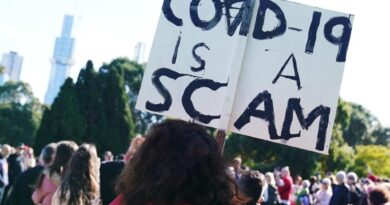Systematic review on the association of COVID-19-related conspiracy belief with infection-preventive behavior and vaccination willingness – BMC Psychology – BMC Psychology

van Prooijen JW, Douglas KM. Conspiracy theories as part of history: the role of societal crisis situations. Mem Stud. 2017;10:323–33.
LeBoeuf RA, Norton MI. Consequence-cause matching: looking to the consequences of events to infer their causes. J Consum Res. 2012;39:128–41.
Leman P, Cinnirella M. A major event has a major cause: evidence for the role of heuristics in reasoning about conspiracy theories. Soc Psychol Rev. 2007;9:18–28.
Spinney L. Pale rider: the Spanish flu of 1918 and how it changed the World. Public Affairs; 2017.
Bangerter A, Krings F, Mouton A, Gilles I, Green EGT, Clémence A. Longitudinal investigation of public trust in institutions relative to the 2009 H1N1 pandemic in Switzerland. PLoS ONE. 2012;7(11):e49806.
Sanche S, Lin YT, Xu C, Romero-Severson E, Hengartner N, Ke R. High contagiousness and rapid spread of severe acute respiratory syndrome coronavirus 2. Emerg Infect Dis. 2020;26:1470–7.
Salmon DA, Dudley MZ, Brewer J, Kan L, Gerber JE, Budigan H, et al. COVID-19 vaccination attitudes, values and intentions among United States adults prior to emergency use authorization. Vaccine. 2021;39:2698–711.
Earnshaw VA, Bogart LM, Klompas M, Katz IT. Medical mistrust in the context of Ebola: implications for intended care-seeking and quarantine policy support in the United States. J Health Psychol. 2019;24(2):219–28.
Gillman J, Davila J, Sansgiry S, Parkinson-Windross D, Miertschin N, Mitts B, et al. The effect of conspiracy beliefs and trust on HIV diagnosis, linkage, and retention in young MSM with HIV. J Health Care Poor Underserved. 2013;24(1):36–45.
Goreis A, Voracek M. A systematic review and meta-analysis of psychological research on conspiracy beliefs: field characteristics, measurement instruments, and associations with personality traits. Front Psychol. 2019;10:205.
Stanley M, Barr N, Peters K, Seli P. Analytic-thinking predicts hoax beliefs and helping behaviors in response to the COVID-19 Pandemic2020.
Oliver JE, Wood T. Medical conspiracy theories and health behaviors in the United States. JAMA Intern Med. 2014;174(5):817–8.
Jolley D, Douglas K. The social consequences of conspiracism: exposure to conspiracy theories decreases intentions to engage in politics and to reduce one’s carbon footprint. Br J Psychol. 2014;105:35–56.
Hornsey MJ, Harris EA, Fielding KS. The psychological roots of anti-vaccination attitudes: a 24-nation investigation. Health Psychol. 2018;37(4):307–15.
Jolley D, Douglas K. The effects of anti-vaccine conspiracy theories on vaccination intentions. PLoS ONE. 2014;9(2):e89177.
Greenwood B. The contribution of vaccination to global health: past, present and future. Philos Trans R Soc Lond B Biol Sci. 2014;369:20130433.
Hodgson SH, Mansatta K, Mallett G, Harris V, Emary KRW, Pollard AJ. What defines an efficacious COVID-19 vaccine? A review of the challenges assessing the clinical efficacy of vaccines against SARS-CoV-2. Lancet Infect Dis. 2021;21(2):e26–35.
Lu D, Aleta A, Ajelli M, Pastor-Satorras R, Vespignani A, Moreno Y. Data-driven estimate of SARS-CoV-2 herd immunity threshold in populations with individual contact pattern variations2021.
Kenyon C. Flattening-the-curve associated with reduced COVID-19 case fatality rates—an ecological analysis of 65 countries. J Infect. 2020;81(1):e98–9.
Douglas KM, Uscinski JE, Sutton RM, Cichocka A, Nefes T, Ang CS, et al. Understanding conspiracy theories. Polit Psychol. 2019;40:3–35.
WHO. Rolling updates on coronavirus disease (COVID-19). 2021. https://www.who.int/emergencies/diseases/novel-coronavirus-2019/events-as-they-happen.
Teovanović P, Lukić P, Zupan Z, Lazić A, Ninković M, Žeželj I. Irrational beliefs differentially predict adherence to guidelines and pseudoscientific practices during the COVID-19 pandemic. Appl Cogn Psychol. 2020;35:486–96.
Freeman D, Waite F, Rosebrock L, Petit A, Causier C, East A, et al. Coronavirus conspiracy beliefs, mistrust, and compliance with government guidelines in England. Psychol Med. 2020;52:1–13.
Alper S, Bayrak F, Yilmaz O. Psychological correlates of COVID-19 conspiracy beliefs and preventive measures: evidence from Turkey. Curr Psychol. 2020;40:1–10.
Kowalski J, Marchlewska M, Molenda Z, Górska P, Gawęda Ł. Adherence to safety and self-isolation guidelines, conspiracy and paranoia-like beliefs during COVID-19 pandemic in Poland—associations and moderators. Psychiatry Res. 2020;294:113540.
Oleksy T, Wnuk A, Maison D, Łyś A. Content matters. Different predictors and social consequences of general and government-related conspiracy theories on COVID-19. Pers Individ Dif. 2021;168:110289.
Bierwiaczonek K, Kunst JR, Pich O. Belief in COVID-19 conspiracy theories reduces social distancing over time. Appl Psychol Health Well Being. 2020;12:1270–85.
Earnshaw VA, Eaton LA, Kalichman SC, Brousseau NM, Hill EC, Fox AB. COVID-19 conspiracy beliefs, health behaviors, and policy support. Transl Behav Med. 2020;10(4):850–6.
Romer D, Jamieson KH. Conspiracy theories as barriers to controlling the spread of COVID-19 in the U.S. Soc Sci Med. 2020;263:113356.
Allington D, Duffy B, Wessely S, Dhavan N, Rubin J. Health-protective behaviour, social media usage and conspiracy belief during the COVID-19 public health emergency. Psychol Med. 2020;51:1–7.
Garry J, Ford R, Johns R. Coronavirus conspiracy beliefs, mistrust, and compliance: taking measurement seriously. Psychol Med. 2020. https://doi.org/10.1017/S0033291720005164.
Imhoff R, Lamberty P. A bioweapon or a hoax? The link between distinct conspiracy beliefs about the coronavirus disease (COVID-19) outbreak and pandemic behavior. Soc Psychol Personal Sci. 2020;11:1110–8.
Biddlestone M, Green R, Douglas KM. Cultural orientation, power, belief in conspiracy theories, and intentions to reduce the spread of COVID-19. Br J Soc Psychol. 2020;59(3):663–73.
Bertin P, Nera K, Delouvée S. Conspiracy Beliefs, rejection of vaccination, and support for hydroxychloroquine: a conceptual replication-extension in the COVID-19 pandemic context. Front Psychol. 2020;11:565128. https://doi.org/10.3389/fpsyg.2020.565128.
Freeman D, Loe BS, Chadwick A, Vaccari C, Waite F, Rosebrock L, et al. COVID-19 vaccine hesitancy in the UK: the Oxford coronavirus explanations, attitudes, and narratives survey (Oceans) II. Psychol Med. 2020. https://doi.org/10.1017/S0033291720005188.
Prati G. Intention to receive a vaccine against SARS-CoV-2 in Italy and its association with trust, worry and beliefs about the origin of the virus. Health Educ Res. 2020;35(6):505–11.
Salali GD, Uysal MS. COVID-19 vaccine hesitancy is associated with beliefs on the origin of the novel coronavirus in the UK and Turkey. Psychol Med. 2020. https://doi.org/10.1017/S0033291720004067.
Sallam M, Dababseh D, Eid H, Al-Mahzoum K, Al-Haidar A, Taim D, et al. High rates of COVID-19 vaccine hesitancy and its association with conspiracy beliefs: a study in Jordan and Kuwait among other Arab countries. Vaccines. 2021;9(1):42.
Rosenthal JA. Qualitative descriptors of strength of association and effect size. J Soc Serv Res. 1996;21(4):37–59.
Brewer NT, Chapman GB, Gibbons FX, Gerrard M, McCaul KD, Weinstein ND. Meta-analysis of the relationship between risk perception and health behavior: the example of vaccination. Health Psychol. 2007;26(2):136–45.
Lukić P, Žeželj I, Stanković B. How (ir)rational is it to believe in contradictory conspiracy theories? Eur J Psychol. 2019;15(1):94–107.
Wood MJ, Douglas KM, Sutton RM. Dead and alive: beliefs in contradictory conspiracy theories. Soc Psychol Personal Sci. 2012;3(6):767–73.
Chadwick A, Kaiser J, Vaccari C, Freeman D, Lambe S, Loe BS, et al. Online social endorsement and Covid-19 vaccine hesitancy in the United Kingdom. Soc Media Soc. 2021;7(2):20563051211008816.
Eibensteiner F, Ritschl V, Nawaz FA, Fazel SS, Tsagkaris C, Kulnik ST, et al. People’s willingness to vaccinate against COVID-19 despite their safety concerns: Twitter poll analysis. J Med Internet Res. 2021;23(4):e28973.
Staetsky D. Antisemitism in contemporary Great Britain: a study of attitudes towards Jews and Israel. Institute for Jewish Policy Research; 2017.
Douglas KM, Sutton RM, Cichocka A. The psychology of conspiracy theories. Curr Dir Psychol Sci. 2017;26(6):538–42.
van Prooijen JW, van Dijk E. When consequence size predicts belief in conspiracy theories: the moderating role of perspective taking. J Exp Soc Psychol. 2014;55:63–73.
Maftei A, Holman AC. SARS-CoV-2 Threat Perception and Willingness to Vaccinate: The Mediating Role of Conspiracy Beliefs. Front Psychol. 2021;12(3371).
Islam MS, Kamal A-HM, Kabir A, Southern DL, Khan SH, Hasan SMM, et al. COVID-19 vaccine rumors and conspiracy theories: The need for cognitive inoculation against misinformation to improve vaccine adherence. PLOS ONE. 2021;16(5):e0251605.
This article has been archived for your research. Find the original article here.


